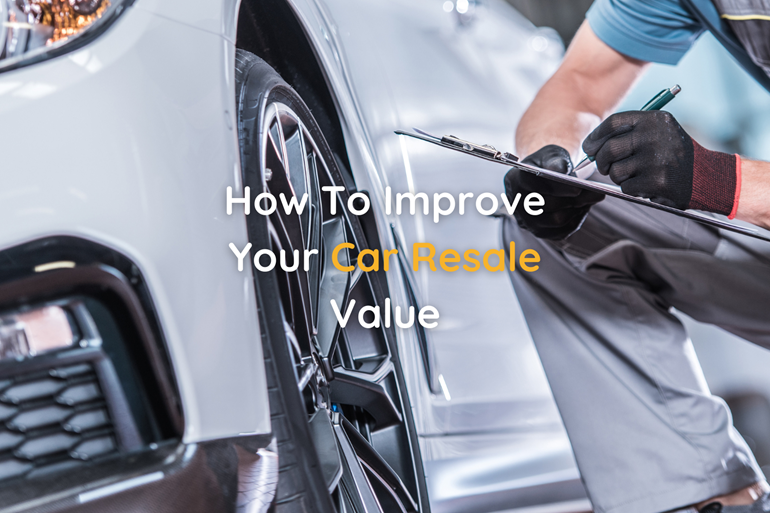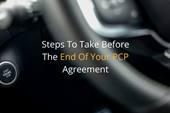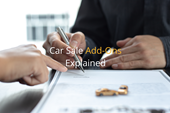
How To Improve Your Car Resale Value
Sell Your Car For The Most Money With Our Top Tips
If you’ve just bought a new car, the last thing you want to consider is its resale value. Sadly, most motorists are in for a major shock when trading in or selling privately, especially after a few years of ownership.
Unless you’re driving a rare classic or hyper-performance sports car depreciation is inevitable. The average car loses around 10-15% of its value within the first year of ownership, rising to 50% at the three-year mark.
It’s not all doom and gloom though (and we certainly don’t want to burst that ‘new car bubble’), a few simple steps can help maintain and even increase your car's resale value. We’ll take a look at them in detail below, first through, let’s look at how depreciation can affect your motoring long term…
Protecting Your Car Against Depreciation
Depreciation can cause issues for motorists any time; if your car is declared a total loss.
Most drivers aren’t aware that if their car is declared a total loss (often known as a ‘write off), following theft, irreparable damage, accident or a fire, for example, they could be left out of pocket.
Following a total loss, car insurance companies will offer a settlement figure that represents the car’s value at the time; not the purchase price or amount outstanding, which could leave you with a major difference to make up.
Gap insurance can help minimise risk by paying the difference between the insurance settlement figure and the amount still outstanding on a vehicle, helping reduce pressure at an already stressful time.
Learn More: For an estimate of your car's depreciation, try our Car Deprecation Calculator.
Our Tips For Maintaining And Improving Your Car Resale Value
Avoid Modifications
Modified cars are synonymous with bad drivers, creating less appeal and lower value so it pays to keep yours as close to factory standards as possible.
Buyers (including dealerships) will often think the worst if your car has aftermarket parts such as alloys, stereo systems or body kits. If, for whatever reason you do need to adapt your car or want to ‘upgrade’, consider OEM parts such as alloy wheels and exhausts.
Maintain Servicing
It’s no secret that a full-service history book is sought-after by buyers and dealers alike, meaning a greater return on your car whilst also making for smoother driving and greater confidence that it’s roadworthy; which is a win all round!
In the past, service history had to be from manufacturers rather than an independent garage to be worth anything, however, that’s no longer the case. We recommend maintaining a full-service history, as your manufacturer recommends, at any reputable garage that fits your budget.
Keep On Top Of Mechanical Repairs
Mechanical issues such as engine, steering or suspension problems can be costly, dangerous and damaging to your car’s bottom line.
Keeping on top of repairs, as well as MOT advisories, ensures you (and your passengers) are safe, as well as improving your potential trade-in price. Buyers (and dealerships) will look into this, so a clean bill of health will definitely reap rewards.
Keep Repair History
Don’t just have work done! Keep receipts for all the work you have done too.
Buyers will be reassured by seeing a step-by-step of the upkeep of a vehicle, making your car more attractive.
Keep Bodywork In Good Condition
Dents, scuffs and scrapes stick out like a sore thumb and are almost always the first thing a buyer or car salesperson will notice. Cosmetic damage indicates absent-minded driving, often interpreted as a sign of hidden issues, with major damage signalling an unsafe vehicle that probably won’t sell.
Any major damage caused following an accident should be dealt with immediately through your motor insurer, using a manufacturer or reputable garage.
Smaller, cosmetic damage, such as a car park prang, or scraping a wall can be a tricky one though; too small to claim on your insurance, but still expensive to fix. Scratch & Dent Insurance can help, covering smaller damage such as scratches up to 30cm, including any parts and labour needed.
Keep In Clean
Who doesn’t love a shiny and clean car? Buyers and dealerships will look more favourably on your vehicle if it’s tidy so consider a valet before you get down to business.
Eating Drinking And Smoking
Following on from general cleanliness, reducing eating, drinking and smoking in your car will benefit its resale value later on.
Spilled drinks cause upholstery staining, with food leaving crumbs and grease marks which are unappealing to future buyers. As for smoking, it leaves a noticeable, unpleasant smell that’s difficult to get rid of; which many buyers will avoid outright.
Minimise Mileage
Obviously, your mileage is dictated by your lifestyle, with most adding mileage driving to work on a daily basis. That said, you can take some steps to minimise your mileage elsewhere, such as keeping weekend driving to a minimum.
The lower the mileage, the more you’ll be offered for your part exchange.
If your car is financed through a PCP excessive mileage could actually cost you money. Be sure to check your contract and stick to the mileage quoted in your terms and conditions, otherwise, you will be charged a fee for any extra miles.

Keep Kerbed Alloys At Bay
Nobody wants to be driving on damaged wheels, which is why you’ll be offered less for your car if it has kerbed, scuffed or scraped alloy wheels.
At best, buyers will see poorly maintained wheels as an eye sore, at worst, a sign of untold damage.
Keep on top of wheel maintenance, having them refurbished as needed, with any major damage dealt with immediately (as this could be dangerous and illegal).
Consider Alloy Wheel Insurance which covers 5 alloys up to £150 each, with a technician coming to you.
Our Final Word
For all but the luckiest drivers, depreciation is inevitable. Our advice is to enjoy your car as much as possible, with the realistic expectation that it won’t hold its value.
Keep our top tips in mind and you’ll still see a decent return on your car when it comes to trade-in time, without too much fuss. Remember, when you’re buying a new car, having a realistic expectation of your part exchange car’s value is the best way to approach any deal.
If you’ve enjoyed reading, please share this blog with your network. You never know, it may help them too! If you have any other suggestions we may have missed, feel free to message DM Luke using our social media channels.
Pin It!













